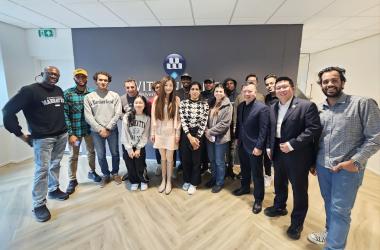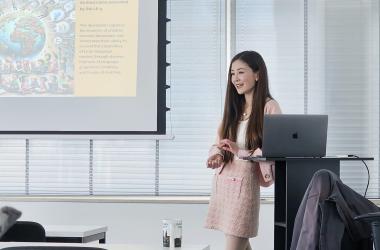Wittenborg Students and Expert Discuss Impact of Artificial Intelligence on Business

Dr Jie Li’s Guest Lecture Focused on Evolution of Human-AI Experience
A group of Wittenborg MBA students have had the opportunity to learn more about how artificial intelligence (AI) has impacted business from Dr Jie Li, an expert in the field. Li, a human-computer interaction (HCI) researcher who currently serves as the Head of Research at EPAM Netherlands, delivered a guest lecture at the school’s Amsterdam study location on 19 March.
Titled ‘The Transformation of User Experience (UX) to Human AI Experience (HAX): Artificial Intelligence in Business’, the activity covered a wide range of topics, including the history of significant human-computer interaction paradigm shifts.
Starting with the move from non-interactive batch processing to command-line-based interaction, Li discussed the evolution to today’s widely used graphical user interface (GUI) and touch screens. According to her, the most recent paradigm shift involves intent-based, prompt-triggered interactions with AI systems like ChatGPT and Midjourney.
“This shift has, on the one hand, democratised design and art, and on the other hand, it has led us to consider more complex, multimodal interactions beyond the current GUI screens and buttons. These are evidenced by voice interfaces and gesture-based interactions in products like chatbots and virtual reality devices. However, the methods by which AI generates these outputs are not always transparent to users; the algorithms and data training often remain obscured, which could potentially lead to trust issues in human-AI collaboration over time,” she points out.
The main purpose of the lecture was to highlight the necessity for professionals to quickly adapt to rapid AI advancements and to prepare for designing human-AI interactions. Issues such as biases in AI, ethical considerations and the need for emotional depth in AI were highlighted, emphasising the subtleties in crafting experiences that are inclusive and that respect human values.
“This theme is relevant for MBA students as they are poised to assume roles as product owners, service designers, engineers or business strategists. Upskilling to gain basic AI literacy is crucial for their career development, and it is equally important to ensure that AI’s progression is influenced by cross-disciplinary experts to promote participatory AI. The development of AI should not be monopolised by big tech or AI specialists alone,” the guest lecturer stresses.
Li comments that while she frequently teaches research students at universities, this was her first time lecturing such a diverse group of students in terms of background and work experience.

“I enjoyed the interaction with Wittenborg students. Their curiosity and practical questions directed us to consider how we can evolve today’s user-centred design to encompass human-AI experience design. I particularly appreciated a question from a student highlighting that while we focus on the harm AI may cause, we often overlook the greater damage that unethical humans using AI could inflict. Therefore, human-AI experience design should not just concentrate on regulating the development of AI but also on overseeing who uses AI and how it should be responsibly used.”
Vietnamese student Giao Nguyen, pursuing an MBA degree in Data Analytics, said that by attending the lecture she was able to learn more about how to create an environment where people and AI can work well together.
“The most enlightening insight for me is that in order to use AI excellently and make judgements based on AI's recommendation, I have to be good at my job first. Therefore, despite the availability of AI, people will also need to learn their tasks well and master them.”
For MBA student Solomon Audu, from Nigeria, also specialising in Data Analytics, the workshop was an enjoyable and interesting opportunity to understand some of the emerging dynamics of the human-AI Experience.
“This session opened my eyes to the fact that in the future AI will become a team member and not just a tool. We now have some articles with ChatGPT as co-author. However, we are still in control of AI and the possibility of losing control over it is highly unlikely. There is still a big space between AI and human capabilities, both now and in the future, and there is nothing about AI that is inevitable,” he underlined.
Audu added that AI technologies can no longer be ignored. “Those who embrace them early will be winners, and those who delay it will have to play catch-up.”
WUP 09/05/2024
by Ulisses Sawczuk
©WUAS Press
TAGS
